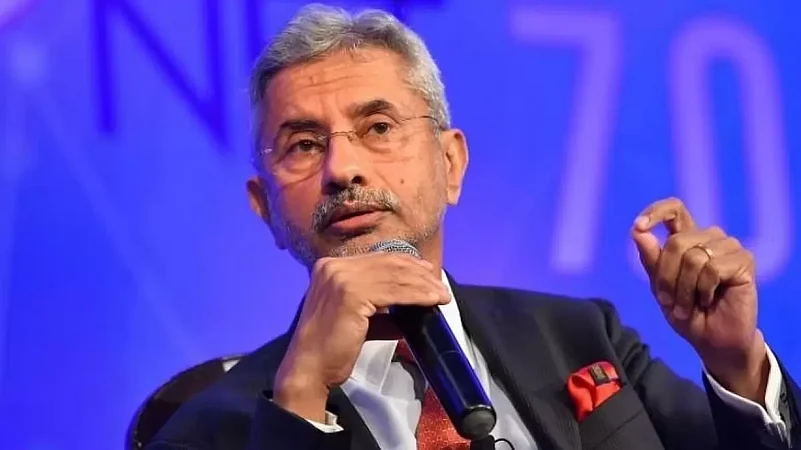In clear message to Beijing, India on Thursday said any expectation of normalisation of its ties with China when the border situation in eastern Ladakh is not normal is unfounded with External Affairs Minister S Jaishankar describing the "forward deployment" of troops as the main problem.
At a special media briefing on the Modi government's foreign policy in the last nine years, Jaishankar said India also wants to improve the relations with China, but it can only be possible when there is peace and tranquillity in the border areas.
He said China is the only leading country with which India's relations have not advanced in the last few years as it violated border agreements in 2020 and deployed large numbers of troops along the frontier.
Jaishankar said that India has made it very clear to China that until there is peace and tranquillity in border areas, the relationship between the two countries cannot progress.
India does not get swayed by coercion, inducements and false narratives, he said while citing examples of New Delhi's approach towards the situation along the Northern border and its opposition to China's Belt and Road Initiative.
The Indian and Chinese troops are locked in an over three-year confrontation in certain friction points in eastern Ladakh even as the two sides completed disengagement from several areas following extensive diplomatic and military talks.
Jaishankar said the two sides will have to find ways for disengagement of the troops and that the current impasse is not to China's interests either.
"The fact is the relationship is impacted. And the relationship will continue to be impacted. If there is any expectation that somehow we will normalise (ties) while the border situation is not normal, that's not a well-founded expectation," he said replying to a volley of questions.
Asked to clarify whether China has occupied Indian territory following the border row that erupted in May 2020, Jaishankar said the problem is of "forward deployment of troops".
The ties between the two countries nosedived significantly following the fierce clash in the Galwan Valley in June 2020 that marked the most serious military conflict between the two sides in decades.
"We want to improve relations with China. But it will be possible only when there is peace and tranquillity in border areas and if there is an agreement, it should be adhered to," he said.
Jaishankar said both sides are engaged in talks to resolve the row.
"It is not that communications have broken down. The point is that with China, even before Galwan happened, we were talking to the Chinese saying that look we are seeing movement of your forces which in our view is violative of our understanding. The morning after Galwan happened, I actually spoke to my (Chinese) counterpart," he said.
Since then, he said both sides have been engaged in talks at diplomatic and military levels.
"At the end of the day disengagement is a very detailed process," he said adding the details of it have to be worked out by people on the ground.
The external affairs minister said India's ties with all the leading countries and key groupings are on an upswing, except with China.
Asked why, he said: "That answer can only be given by China. Because China consciously for some reason chose in 2020 to break agreements to move forces to the border areas and seek to coerce us.
"It has been made very clear to them that until there is peace and tranquillity in border areas, our relationship cannot progress. So that is the obstacle that is holding that back," he said.
On Congress leader Rahul Gandhi's charge that China has captured Indian territory in eastern Ladakh, Jaishankar said the issue is of forward deployment and the forces from both sides are deployed very close to each other.
Responding to allegations by Gandhi about China building a bridge at Pangong Lake, Jaishankar said the area was occupied by the Chinese side in 1962.
On Congress' allegations of China developing a village in disputed areas in Arunachal Pradesh, he said the area has been under Chinese occupation since 1959.
China has occupied territory since the 1950s and the neglect of border infrastructure by past governments had also put Indian troops at a disadvantage, he said.
"I do not want to go into those famous statements that our best defence is neglect of the border so that other people cannot come forward. But the result was that our own troops were severely disadvantaged when they had to respond," he said.
The eastern Ladakh border standoff erupted on May 5, 2020, following a violent clash in the Pangong lake area.
As a result of a series of military and diplomatic talks, the two sides completed the disengagement process in 2021 on the north and south banks of the Pangong lake and in the Gogra area.
On China's growing friendship with Russia, he did not comment, but asserted that New Delhi's relations with Moscow have been very steady.
"There are reasons as leadership in both countries understand the importance of the ties. We did not do anything that would raise a question mark over our relationship," he said.
Jaishankar said India's ties with all leading countries except China is on a significant upswing.
"In each of the relations, the Modi government has put in place policies and the prime minister himself has sort of led the diplomatic efforts from the front," he said.
-With PTI Input


























